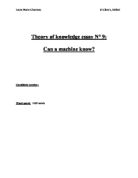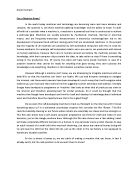Laura Pastre-Chauveau St Clare’s, Oxford
Theory of knowledge essay N° 9:
Can a machine know?
Candidate number:
Word count: 1569 words
Machines have become part of our everyday life, humans cannot live without them. In order to answer the: “Can a machine know?”, it is important to define certain aspects of the question. What is a machine? What is knowledge? Is the relation between these two things very evident? I will divide the essay into three main parts. The first one will talk about the definition of a machine, the meaning of knowledge, and I will make clear that there is a difference between “to know” and “to think”. The second one, which will agree with the statement, will explain the concept of artificial intelligence stating the differences between conventional artificial intelligence and computational artificial intelligence. I will also explain the different ways of knowing that a machine and a human share. Finally, I will talk about the machines being programmed by humans; I will choose some examples of machines, which I will submit to Plato’s definition of knowledge. I will show that a machine cannot know like a human, stating the ways of knowing that it does not share with a human being. I will discuss two experiments related to knowledge and machines, and I will consider ethical implications.
In the 21st century, people use the word “machine” for electronic tools or as a word coming from the slang for a computer, but a machine is any mechanical or organic device that transmits or modifies energy to perform or assist in the performance of tasks. It makes life easier for humans and gives them more power, as Henry Ward Beecher said: “A tool is but the extension of a man's hand and a machine is but a complex tool, and he that invents a machine augments the power of man and the well-being of mankind”. It normally requires some energy source and accomplishes some sort of . So wheels, chronometers, pumps, calculators, and of course, computers, are all machines. But there are also biological machines such as cells, viruses, and therefore human beings. To answer the question: “Can a machine know?” we also have to define the term “knowledge”. Plato said that knowledge was a “Justified true belief” but in general, knowledge is what is known. There is no single definition of knowledge on which people agree, but there are numerous theories and continued debates about the nature of knowledge. Knowledge acquisition involves complex cognitive processes: perception, learning, communication, association, and . The term knowledge is also used to mean the confident of a subject, potentially with the ability to use it for a specific purpose. There are different kinds of knowledge: someone can know if someone else is feeling bad - this is “knowing that”. This is related to perception and emotions. We can also know that it will rain tomorrow because the sky is getting darker: this is related to reason. There is also the “knowing how”, which means that we know how to do things, helped by our instinct. When we answer the question about whether a machine can know or not, we have to discuss the difference between “to know” and “to think”. Indeed, thinking involves a judgment, it exercises the mind in order to make inferences, decisions, or arrive at a solution. Knowing is completely different. It is being aware of the truth, having a belief or faith in something regarded as true beyond any doubt. So we can say that “to know” is objective because it doesn’t involve our opinion, but “to think” is subjective because it does.






